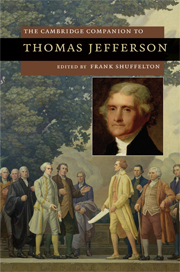Book contents
- Frontmatter
- Introduction
- 1 The Declaration of Independence and the new nation
- 2 Jefferson’s conception of republican government
- 3 Notes on the State of Virginia and the Jeffersonian West
- 4 Jefferson and Native Americans: policy and archive
- 5 Race and slavery in the era of Jefferson
- 6 Jefferson’s people: slavery at Monticello
- 7 Jefferson, science, and the Enlightenment
- 8 Thomas Jefferson and the creation of the American architectural image
- 9 The politics of pedagogy: Thomas Jefferson and the education of a democratic citizenry
- 10 Jefferson and religion: private belief, public policy
- 11 Jefferson and the language of friendship
- 12 Jefferson and Adams: friendship and the power of the letter
- 13 The resonance of minds: Thomas Jefferson and James Madison in the republic of letters
- 14 Jefferson and the democratic future
- Further reading
- Index
Introduction
Published online by Cambridge University Press: 28 May 2009
- Frontmatter
- Introduction
- 1 The Declaration of Independence and the new nation
- 2 Jefferson’s conception of republican government
- 3 Notes on the State of Virginia and the Jeffersonian West
- 4 Jefferson and Native Americans: policy and archive
- 5 Race and slavery in the era of Jefferson
- 6 Jefferson’s people: slavery at Monticello
- 7 Jefferson, science, and the Enlightenment
- 8 Thomas Jefferson and the creation of the American architectural image
- 9 The politics of pedagogy: Thomas Jefferson and the education of a democratic citizenry
- 10 Jefferson and religion: private belief, public policy
- 11 Jefferson and the language of friendship
- 12 Jefferson and Adams: friendship and the power of the letter
- 13 The resonance of minds: Thomas Jefferson and James Madison in the republic of letters
- 14 Jefferson and the democratic future
- Further reading
- Index
Summary
Thomas Jefferson was born in 1743 at Shadwell, his father's plantation near present-day Charlottesville, Virginia. At the time of Jefferson's birth Shadwell was near the western limit of white settlement, but by the time he practiced as a lawyer twenty-five years later the frontier had moved over 100 miles further west. By the time of his death, fifty years to the day after the Declaration of Independence, Virginia was a part of a new nation, the United States, whose limits had moved over 2,000 miles farther west. Jefferson, as the author of the Declaration and as the president who acquired the Louisiana Purchase, played a key role in each of these transformations. He was educated in local schools and at the College of William and Mary before reading law with George Wythe, who had been mentoring the young Jefferson since his arrival in Williamsburg. One of the most learned lawyers in the colonies, Wythe would go on to be a signer of the Declaration of Independence and the first Professor of Law at the College of William and Mary. Subsequently Jefferson practiced as a lawyer and also entered the Virginia legislature, where he aligned himself with the more radical members who were already questioning the authority of Parliament over the colonies. In 1774 he proposed instructions for the Virginia delegates to the first Continental Congress, which had called for representatives of the thirteen North American colonies to meet in Philadelphia in order to discuss responses to supposed British restrictions on the colonies. Subsequently published as A Summary View of the Rights of British America and reprinted in Philadelphia and London, this pamphlet informed King George III that “kings are the servants, not the proprietors of the people” and established Jefferson's reputation as an effective writer on behalf of the colonial cause.
- Type
- Chapter
- Information
- The Cambridge Companion to Thomas Jefferson , pp. 1 - 11Publisher: Cambridge University PressPrint publication year: 2009



